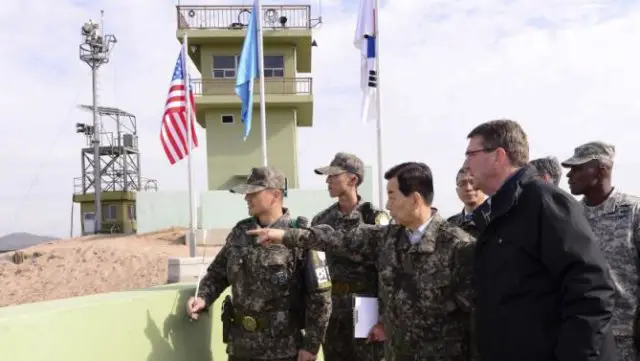Breaking news
US reaffirms support to South Korea amid North Korea's growing nuclear threats 20211154.
| 2015
| a | |||
|
|
|||
|
Defence & Security News - South Korea & United States
|
|||
|
|
|||
| US reaffirms support to South Korea amid North Korea's growing nuclear threats | |||
|
South Korea and the U.S. agreed on Monday that they will not tolerate any aggression or military provocation by North Korea, reaffirming the U.S.' commitment to provide "extended deterrence" against the communist country's growing nuclear threats, said Korean medias on Nov. 2, 2015.
|
|||
|
|
|||
 South Korea's Defense Minister Han Min-koo and US Defense Secretary Ashton Carter South Korea's Defense Minister Han Min-koo and US Defense Secretary Ashton Carter |
|||
|
|
|||
|
"Defense Minister Han Min-koo and Defense Secretary Ashton Carter reaffirmed that any North Korean aggression or military provocation is not to be tolerated and the Republic of Korea and the U.S. would work shoulder-to-shoulder to demonstrate our combined resolve," said a joint statement issued after their annual Security Consultative Meeting (SCM) held in Seoul.
During the 47th SCM, the allies' major venue for defense issues, Secretary Carter also guaranteed U.S.' commitment to "provide and strengthen extended deterrence for South Korea, using the full range of military capabilities including the U.S. nuclear umbrella, conventional strike and missile defense capabilities." The U.S. security reassurance comes as North Korea is anticipated to conduct its fourth nuclear test or a long-range missile test launch in the near future. In May, the country test-fired a submarine-launched ballistic missile, escalating security concerns on the Korean Peninsula and over the North's advancing inter-continental ballistic missile capabilities. Tensions between South and North Korea had steeply escalated to the brink of a military confrontation in August following North Korea planting landmines on the South Korean side of the Demilitarized Zone that seriously injured two South Korean soldiers. The rival Koreas also engaged in an exchange of live fire over the border that month before they reached a last-minute agreement to resolve the tension. "Minister Han and Secretary Carter condemned North Korea's underwater ballistic missile-related ejection test from a submarine on May 8 as a clear violation of numerous U.N. Security Council resolutions," according to the joint statement. The officials urged North Korea to cease all nuclear-related programs "immediately" including those at its Yongbyon nuclear facility and to abandon all nuclear weapons and programs in a "complete, verifiable and irreversible manner." Until South Korea has the full capabilities to conduct intelligence, reconnaissance and counter-artillery operations against North Korea, the allies will postpone the planned return of Washington-held wartime operational control of South Korean troops, Carter said, referring to the signing of the "Conditions-based Operational Control Transition Plan" during the meeting. The signed plan specifically laid out under what conditions Seoul will take for the OPCON over its own forces. Last year, the allies initially agreed in their SCM in Washington to delay the transfer, previously set for late 2015, until South Korea gains full defense capabilities. The timing is estimated to be around mid-2020 when South Korea will have finished the installation of its indigenous defense systems, Kill Chain and Korean Air and Missile Defense. Han reiterated the defense system plans, saying that they will be critical military capabilities for responding to North Korean nuclear and missile threats and interoperable with the U.S. defense system. Until then, the U.S. will also retain its counter-artillery forces close to the inter-Korean border, the statement said, referring to the U.S. Force Korea's 210th Field Artillery Brigade based right below the Demilitarized Zone. The top officials "reaffirmed the commitment to maintain U.S. counter-fires forces in their current location north of the Han River until the ROK forces' counter-fires capability is certified... by around the year 2020." Han and Carter also endorsed an enhanced set of anti-North Korea operation plans to defend South Korea from North Korean missile, nuclear, chemical and biological threats by approving implementation guidance on them. |
|||



















